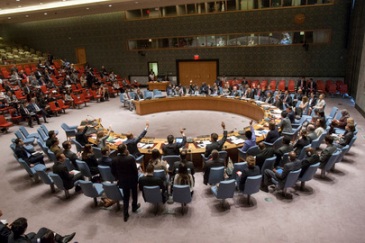Security Council urges unfettered access to UN experts, says willing for sanctions on rebels rejecting peace.
February 8, 2017 (KHARTOUM) – The United Nations Security Council (UNSC) Wednesday renewed until 12 March 2018 the mandate of the Panel of Experts monitoring of arms embargo and generally sanctions imposed on those behind instability in Sudan’s western Darfur region.

The Unanimously endorsed resolution further underscores “the need for the Panel to have full and unfettered access to all of Darfur to fulfil its mandate, throughout the length of its mandate”, stressing that “it will monitor the degree of cooperation of the Government of Sudan on such matters”.
The five independent experts said they not able to access Darfur since the last renewal of the panel’s mandate on 10 February 2016, pointing to the non- issuance of visas by the Sudanese government.
In a report to the UNSC on 9 January 2017, the Panel said it had received a note from the Sudan’s permanent mission to the United Nations on 15 December 2016 saying their visa is delayed until the reconstitution of the national mechanism for resolution 1591 (2005).
On 20 January 2017 Ukrainian Ambassador Volodymyr Yelchenko the head of UNSC Sudan Sanctions Committee, which oversees the sanctions measures imposed on Sudan in accordance with the resolution 1591 (2005), briefed the Council on the committee work and focused on the Panel of Experts’ final report.
His report underlined that the UN agencies “continue to face access restrictions in providing humanitarian assistance in different regions of Darfur, in particular in the areas of Jebel Marra affected by the 2016 crisis.”
However, UNOCHA during the last week of January, reported the government allowed humanitarian access to Jebel Marra indicating that the NGO International Medical Corps (IMC) has been authorized to reach the mountainous area to provide conflict-affected civilians with nutrition and medical assistance.
The experts in their report acknowledged the “overall reduction” of violence in Darfur pointing it has “mostly become limited to the Jebel Marra region”.
SANCTIONS ON HOLDOUT REBELS
The resolution emphasised also on the need that all the armed groups join the African Union led negations for peace in Darfur. It further went to express readiness to imposing targeted sanction on the rebels obstructing the ongoing efforts for peace in the region.
The resolution urged “all armed groups engaged in conflict in the Jebel Marra area, including the Sudan Liberation Army-Abdul Wahid (SLA/AW) to join the AU-led peace negotiations, as a first step towards a comprehensive and sustainable peace agreement”.
The Council further recalled “its willingness to consider targeted sanctions against individuals or entities who impede the peace process, constitute a threat to stability, in Darfur” and the region, commit violations of international humanitarian or human rights law or other atrocities, or violate the measures implemented by Member States in accordance with relevant resolutions”.
The resolution went further to urge “the non-signatory groups to sign the AU Roadmap urgently as an important milestone in determining a practicable way forward towards a cessation of hostilities and an inclusive political dialogue”.
Several diplomats at the United Nations and the former U.S. special envoy for Sudan said the refusal of the Sudan Liberation Army-Abdel Wahid (SLA/AW) to join the negotiating table impedes the international efforts to end the conflict.
On 12 January, the Sudan peace chief mediator Thabo Mbeki briefed the UNSC via via video teleconference, during an informal interactive dialogue.
He spoke about the unsuccessful efforts of the African Union mediation to end Darfur conflict, stressing that the armed groups involved in the process, SLM-Minni Minnawi and Justice and equality Movement (JEM) continue to reject the Doha Document for Peace in Darfur.
The Panel has to provide a first report on its activities on no later than 12 August 2017 and its final report by 12 January 2018 with its final finding and recommendations.
(ST)
